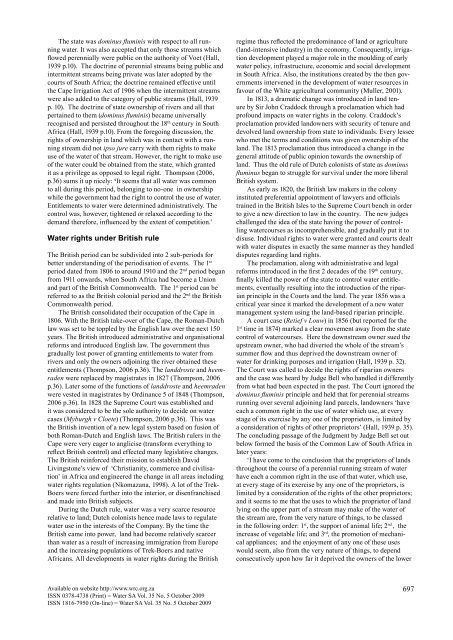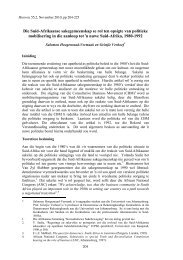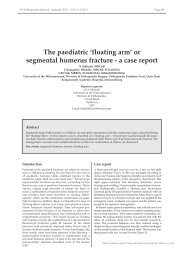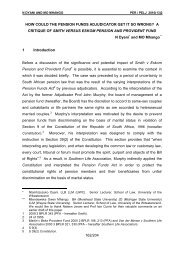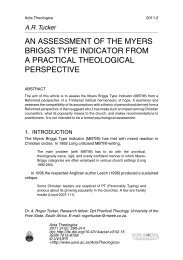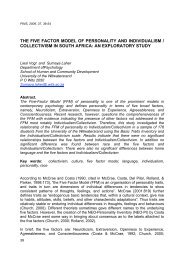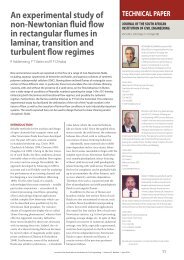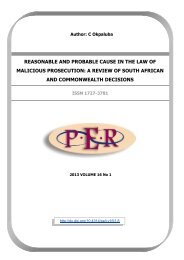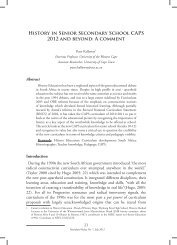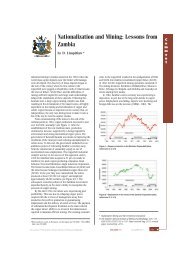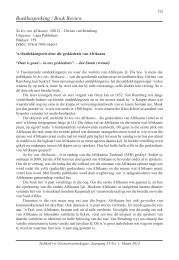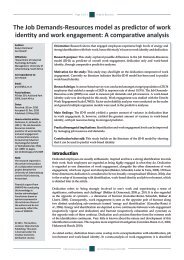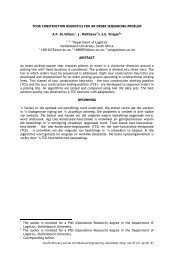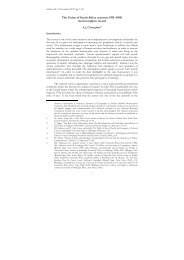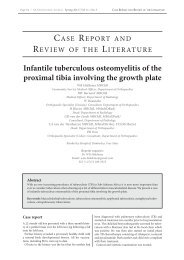A detailed analysis of evolution of water rights in South Africa: An ...
A detailed analysis of evolution of water rights in South Africa: An ...
A detailed analysis of evolution of water rights in South Africa: An ...
You also want an ePaper? Increase the reach of your titles
YUMPU automatically turns print PDFs into web optimized ePapers that Google loves.
The state was dom<strong>in</strong>us flum<strong>in</strong>is with respect to all runn<strong>in</strong>g<br />
<strong>water</strong>. It was also accepted that only those streams which<br />
flowed perennially were public on the authority <strong>of</strong> Voet (Hall,<br />
1939 p.10). The doctr<strong>in</strong>e <strong>of</strong> perennial streams be<strong>in</strong>g public and<br />
<strong>in</strong>termittent streams be<strong>in</strong>g private was later adopted by the<br />
courts <strong>of</strong> <strong>South</strong> <strong>Africa</strong>; the doctr<strong>in</strong>e rema<strong>in</strong>ed effective until<br />
the Cape Irrigation Act <strong>of</strong> 1906 when the <strong>in</strong>termittent streams<br />
were also added to the category <strong>of</strong> public streams (Hall, 1939<br />
p. 10). The doctr<strong>in</strong>e <strong>of</strong> state ownership <strong>of</strong> rivers and all that<br />
perta<strong>in</strong>ed to them (dom<strong>in</strong>us flum<strong>in</strong>is) became universally<br />
recognised and persisted throughout the 18 th century <strong>in</strong> <strong>South</strong><br />
<strong>Africa</strong> (Hall, 1939 p.10). From the forego<strong>in</strong>g discussion, the<br />
<strong>rights</strong> <strong>of</strong> ownership <strong>in</strong> land which was <strong>in</strong> contact with a runn<strong>in</strong>g<br />
stream did not ipso jure carry with them <strong>rights</strong> to make<br />
use <strong>of</strong> the <strong>water</strong> <strong>of</strong> that stream. However, the right to make use<br />
<strong>of</strong> the <strong>water</strong> could be obta<strong>in</strong>ed from the state, which granted<br />
it as a privilege as opposed to legal right. Thompson (2006,<br />
p.36) sums it up nicely: ‘It seems that all <strong>water</strong> was common<br />
to all dur<strong>in</strong>g this period, belong<strong>in</strong>g to no-one <strong>in</strong> ownership<br />
while the government had the right to control the use <strong>of</strong> <strong>water</strong>.<br />
Entitlements to <strong>water</strong> were determ<strong>in</strong>ed adm<strong>in</strong>istratively. The<br />
control was, however, tightened or relaxed accord<strong>in</strong>g to the<br />
demand therefore, <strong>in</strong>fluenced by the extent <strong>of</strong> competition.’<br />
Water <strong>rights</strong> under British rule<br />
The British period can be subdivided <strong>in</strong>to 2 sub-periods for<br />
better understand<strong>in</strong>g <strong>of</strong> the periodisation <strong>of</strong> events. The 1 st<br />
period dated from 1806 to around 1910 and the 2 nd period began<br />
from 1911 onwards, when <strong>South</strong> <strong>Africa</strong> had become a Union<br />
and part <strong>of</strong> the British Commonwealth. The 1 st period can be<br />
referred to as the British colonial period and the 2 nd the British<br />
Commonwealth period.<br />
The British consolidated their occupation <strong>of</strong> the Cape <strong>in</strong><br />
1806. With the British take-over <strong>of</strong> the Cape, the Roman-Dutch<br />
law was set to be toppled by the English law over the next 150<br />
years. The British <strong>in</strong>troduced adm<strong>in</strong>istrative and organisational<br />
reforms and <strong>in</strong>troduced English law. The government thus<br />
gradually lost power <strong>of</strong> grant<strong>in</strong>g entitlements to <strong>water</strong> from<br />
rivers and only the owners adjo<strong>in</strong><strong>in</strong>g the river obta<strong>in</strong>ed these<br />
entitlements (Thompson, 2006 p.36). The landdroste and heemraden<br />
were replaced by magistrates <strong>in</strong> 1827 (Thompson, 2006<br />
p.36). Later some <strong>of</strong> the functions <strong>of</strong> landdroste and heemraden<br />
were vested <strong>in</strong> magistrates by Ord<strong>in</strong>ance 5 <strong>of</strong> 1848 (Thompson,<br />
2006 p.36). In 1828 the Supreme Court was established and<br />
it was considered to be the sole authority to decide on <strong>water</strong><br />
cases (Myburgh v Cloete) (Thompson, 2006 p.36). This was<br />
the British <strong>in</strong>vention <strong>of</strong> a new legal system based on fusion <strong>of</strong><br />
both Roman-Dutch and English laws. The British rulers <strong>in</strong> the<br />
Cape were very eager to anglicise (transform everyth<strong>in</strong>g to<br />
reflect British control) and effected many legislative changes.<br />
The British re<strong>in</strong>forced their mission to establish David<br />
Liv<strong>in</strong>gstone’s view <strong>of</strong> ‘Christianity, commerce and civilisation’<br />
<strong>in</strong> <strong>Africa</strong> and eng<strong>in</strong>eered the change <strong>in</strong> all areas <strong>in</strong>clud<strong>in</strong>g<br />
<strong>water</strong> <strong>rights</strong> regulation (Nkomazana, 1998). A lot <strong>of</strong> the Trek-<br />
Boers were forced further <strong>in</strong>to the <strong>in</strong>terior, or disenfranchised<br />
and made <strong>in</strong>to British subjects.<br />
Dur<strong>in</strong>g the Dutch rule, <strong>water</strong> was a very scarce resource<br />
relative to land; Dutch colonists hence made laws to regulate<br />
<strong>water</strong> use <strong>in</strong> the <strong>in</strong>terests <strong>of</strong> the Company. By the time the<br />
British came <strong>in</strong>to power, land had become relatively scarcer<br />
than <strong>water</strong> as a result <strong>of</strong> <strong>in</strong>creas<strong>in</strong>g immigration from Europe<br />
and the <strong>in</strong>creas<strong>in</strong>g populations <strong>of</strong> Trek-Boers and native<br />
<strong>Africa</strong>ns. All developments <strong>in</strong> <strong>water</strong> <strong>rights</strong> dur<strong>in</strong>g the British<br />
regime thus reflected the predom<strong>in</strong>ance <strong>of</strong> land or agriculture<br />
(land-<strong>in</strong>tensive <strong>in</strong>dustry) <strong>in</strong> the economy. Consequently, irrigation<br />
development played a major role <strong>in</strong> the mould<strong>in</strong>g <strong>of</strong> early<br />
<strong>water</strong> policy, <strong>in</strong>frastructure, economic and social development<br />
<strong>in</strong> <strong>South</strong> <strong>Africa</strong>. Also, the <strong>in</strong>stitutions created by the then governments<br />
<strong>in</strong>tervened <strong>in</strong> the development <strong>of</strong> <strong>water</strong> resources <strong>in</strong><br />
favour <strong>of</strong> the White agricultural community (Muller, 2001).<br />
In 1813, a dramatic change was <strong>in</strong>troduced <strong>in</strong> land tenure<br />
by Sir John Craddock through a proclamation which had<br />
pr<strong>of</strong>ound impacts on <strong>water</strong> <strong>rights</strong> <strong>in</strong> the colony. Craddock’s<br />
proclamation provided landowners with security <strong>of</strong> tenure and<br />
devolved land ownership from state to <strong>in</strong>dividuals. Every lessee<br />
who met the terms and conditions was given ownership <strong>of</strong> the<br />
land. The 1813 proclamation thus <strong>in</strong>troduced a change <strong>in</strong> the<br />
general attitude <strong>of</strong> public op<strong>in</strong>ion towards the ownership <strong>of</strong><br />
land. Thus the old rule <strong>of</strong> Dutch colonists <strong>of</strong> state as dom<strong>in</strong>us<br />
flum<strong>in</strong>us began to struggle for survival under the more liberal<br />
British system.<br />
As early as 1820, the British law makers <strong>in</strong> the colony<br />
<strong>in</strong>stituted preferential appo<strong>in</strong>tment <strong>of</strong> lawyers and <strong>of</strong>ficials<br />
tra<strong>in</strong>ed <strong>in</strong> the British Isles to the Supreme Court bench <strong>in</strong> order<br />
to give a new direction to law <strong>in</strong> the country. The new judges<br />
challenged the idea <strong>of</strong> the state hav<strong>in</strong>g the power <strong>of</strong> controll<strong>in</strong>g<br />
<strong>water</strong>courses as <strong>in</strong>comprehensible, and gradually put it to<br />
disuse. Individual <strong>rights</strong> to <strong>water</strong> were granted and courts dealt<br />
with <strong>water</strong> disputes <strong>in</strong> exactly the same manner as they handled<br />
disputes regard<strong>in</strong>g land <strong>rights</strong>.<br />
The proclamation, along with adm<strong>in</strong>istrative and legal<br />
reforms <strong>in</strong>troduced <strong>in</strong> the first 2 decades <strong>of</strong> the 19 th century,<br />
f<strong>in</strong>ally killed the power <strong>of</strong> the state to control <strong>water</strong> entitlements,<br />
eventually result<strong>in</strong>g <strong>in</strong>to the <strong>in</strong>troduction <strong>of</strong> the riparian<br />
pr<strong>in</strong>ciple <strong>in</strong> the Courts and the land. The year 1856 was a<br />
critical year s<strong>in</strong>ce it marked the development <strong>of</strong> a new <strong>water</strong><br />
management system us<strong>in</strong>g the land-based riparian pr<strong>in</strong>ciple.<br />
A court case (Retief v Louw) <strong>in</strong> 1856 (but reported for the<br />
1 st time <strong>in</strong> 1874) marked a clear movement away from the state<br />
control <strong>of</strong> <strong>water</strong>courses. Here the downstream owner sued the<br />
upstream owner, who had diverted the whole <strong>of</strong> the stream’s<br />
summer flow and thus deprived the downstream owner <strong>of</strong><br />
<strong>water</strong> for dr<strong>in</strong>k<strong>in</strong>g purposes and irrigation (Hall, 1939 p. 32).<br />
The Court was called to decide the <strong>rights</strong> <strong>of</strong> riparian owners<br />
and the case was heard by Judge Bell who handled it differently<br />
from what had been expected <strong>in</strong> the past. The Court ignored the<br />
dom<strong>in</strong>us flum<strong>in</strong>is pr<strong>in</strong>ciple and held that for perennial streams<br />
runn<strong>in</strong>g over several adjo<strong>in</strong><strong>in</strong>g land parcels, landowners ‘have<br />
each a common right <strong>in</strong> the use <strong>of</strong> <strong>water</strong> which use, at every<br />
stage <strong>of</strong> its exercise by any one <strong>of</strong> the proprietors, is limited by<br />
a consideration <strong>of</strong> <strong>rights</strong> <strong>of</strong> other proprietors’ (Hall, 1939 p. 35).<br />
The conclud<strong>in</strong>g passage <strong>of</strong> the Judgment by Judge Bell set out<br />
below formed the basis <strong>of</strong> the Common Law <strong>of</strong> <strong>South</strong> <strong>Africa</strong> <strong>in</strong><br />
later years:<br />
‘I have come to the conclusion that the proprietors <strong>of</strong> lands<br />
throughout the course <strong>of</strong> a perennial runn<strong>in</strong>g stream <strong>of</strong> <strong>water</strong><br />
have each a common right <strong>in</strong> the use <strong>of</strong> that <strong>water</strong>, which use,<br />
at every stage <strong>of</strong> its exercise by any one <strong>of</strong> the proprietors, is<br />
limited by a consideration <strong>of</strong> the <strong>rights</strong> <strong>of</strong> the other proprietors;<br />
and it seems to me that the uses to which the proprietor <strong>of</strong> land<br />
ly<strong>in</strong>g on the upper part <strong>of</strong> a stream may make <strong>of</strong> the <strong>water</strong> <strong>of</strong><br />
the stream are, from the very nature <strong>of</strong> th<strong>in</strong>gs, to be classed<br />
<strong>in</strong> the follow<strong>in</strong>g order: 1 st , the support <strong>of</strong> animal life; 2 nd , the<br />
<strong>in</strong>crease <strong>of</strong> vegetable life; and 3 rd , the promotion <strong>of</strong> mechanical<br />
appliances; and the enjoyment <strong>of</strong> any one <strong>of</strong> these uses<br />
would seem, also from the very nature <strong>of</strong> th<strong>in</strong>gs, to depend<br />
consecutively upon how far it deprived the owners <strong>of</strong> the lower<br />
Available on website http://www.wrc.org.za<br />
ISSN 0378-4738 (Pr<strong>in</strong>t) = Water SA Vol. 35 No. 5 October 2009<br />
ISSN 1816-7950 (On-l<strong>in</strong>e) = Water SA Vol. 35 No. 5 October 2009<br />
697


